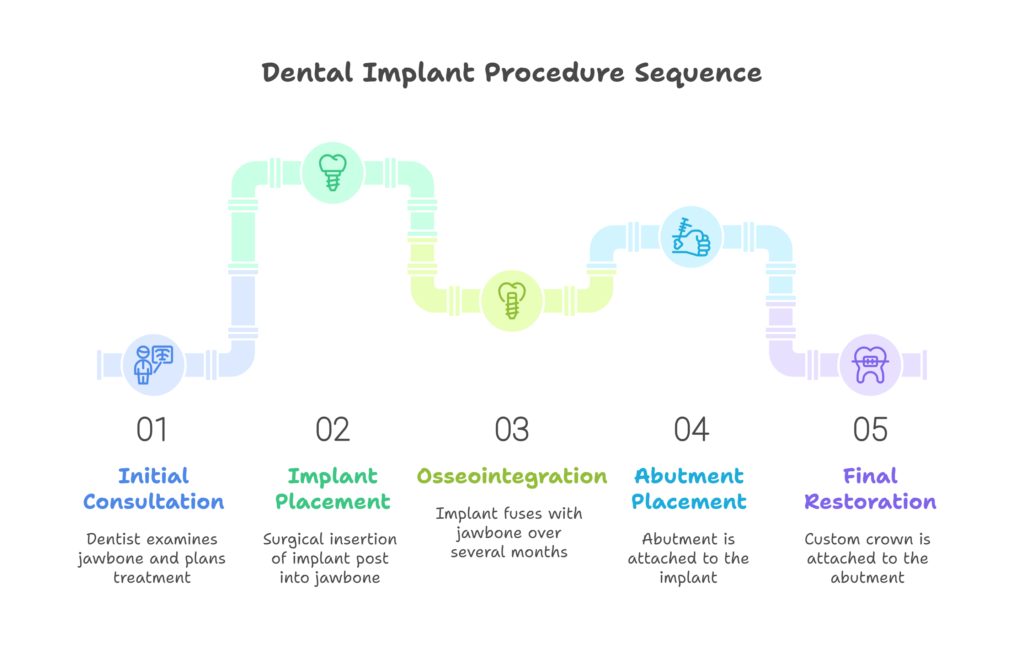Dental implants have emerged as a revolutionary solution for individuals facing tooth loss, providing a reliable and aesthetically pleasing alternative to traditional dentures and bridges. This guide will delve into the intricacies of dental implants, covering everything from their structure and benefits to the procedure involved and post-operative care.
What Are Dental Implants?
Dental implants are artificial tooth roots, typically made from titanium, that are surgically embedded into the jawbone. They serve as a sturdy foundation for replacement teeth, known as crowns, which are custom-made to match the appearance of your natural teeth. The process of integrating the implant with the jawbone is known as osseointegration, which is crucial for the stability and longevity of the implant.
Components of a Dental Implant
A dental implant consists of three primary components:
- Implant Post: This is the screw-like structure that is inserted into the jawbone. It acts as the root of the new tooth.
- Abutment: This connector piece is placed on top of the implant post and extends above the gum line. It serves as the attachment point for the crown.
- Crown: The visible part of the implant, the crown is designed to look and function like a natural tooth.
Why Choose Dental Implants?
Dental implants offer numerous advantages over other teeth replacement options, making them a popular choice among patients.
Aesthetic Appeal
One of the most significant benefits of dental implants is their natural appearance. They are designed to blend seamlessly with your existing teeth, restoring your smile and boosting your confidence.
Enhanced Functionality
Unlike dentures, which can slip or cause discomfort, dental implants are securely anchored in the jawbone. This stability allows for improved chewing and speaking abilities, enabling you to enjoy your favorite foods without worry.
Bone Preservation
When a tooth is lost, the jawbone can begin to deteriorate due to lack of stimulation. Dental implants help preserve bone density by providing the necessary stimulation to the jawbone, preventing further bone loss.
Longevity
With proper care, dental implants can last a lifetime. They are resistant to cavities and do not require the alteration of adjacent teeth, unlike bridges.
The Dental Implant Procedure
The process of getting dental implants typically involves several stages, which can vary based on individual circumstances.
Initial Consultation
The journey begins with a thorough examination by your dentist or oral surgeon. This may include X-rays and 3D imaging to assess the condition of your jawbone and determine the best treatment plan.
Implant Placement
During the surgical procedure, the dentist will administer anesthesia to ensure your comfort. An incision is made in the gum to expose the jawbone, where the implant post will be inserted. Once placed, the gum is stitched back, and the healing process begins.
Osseointegration
Over the next few months, the implant will fuse with the jawbone in a process called osseointegration. This is crucial for the stability of the implant. During this time, a temporary crown may be placed to maintain aesthetics.
Abutment Placement
Once osseointegration is complete, a minor surgical procedure is performed to attach the abutment to the implant. This involves reopening the gum to expose the implant and placing the abutment.
Final Restoration
After the gums heal around the abutment, a custom-made crown is created and attached to the abutment. This final step completes the dental implant process, restoring both function and appearance.

Post-Operative Care
After receiving dental implants, proper care is essential for ensuring their longevity and success.
Oral Hygiene
Maintaining excellent oral hygiene is crucial. Brush and floss your teeth regularly, and consider using an antibacterial mouthwash to keep the implant area clean.
Regular Check-Ups
Schedule regular dental visits for professional cleanings and check-ups. Your dentist will monitor the health of your implants and surrounding tissues.
Avoid Certain Habits
Avoid smoking and excessive alcohol consumption, as these can hinder the healing process and increase the risk of implant failure.
Potential Risks and Complications
While dental implants are generally safe and effective, there are potential risks and complications to be aware of.
Infection
As with any surgical procedure, there is a risk of infection at the implant site. Following post-operative care instructions can help minimize this risk.
Nerve Damage
In some cases, the placement of the implant may affect nearby nerves, leading to numbness or tingling in the gums, lips, or chin.
Implant Failure
Although rare, dental implants can fail due to various factors, including insufficient bone density, infection, or improper placement. Regular follow-ups can help identify and address any issues early on.
Cost of Dental Implants
The cost of dental implants can vary widely based on several factors, including:
- The number of implants needed
- The complexity of the procedure
- The geographic location of the dental practice
- Any additional treatments required, such as bone grafting
While dental implants may have a higher upfront cost compared to other options, their longevity and benefits often make them a worthwhile investment in your oral health.
Who Is a Candidate for Dental Implants?
Most individuals with missing teeth can be considered for dental implants. However, certain factors may affect eligibility:
Good Oral Health
Candidates should have healthy gums and sufficient bone density to support the implant. If bone loss has occurred, bone grafting may be necessary.
Non-Smokers
Smoking can significantly impact the healing process and increase the risk of implant failure. Non-smokers are generally better candidates for the procedure.
Overall Health
Certain medical conditions, such as uncontrolled diabetes or autoimmune diseases, may affect healing and implant success. A thorough medical evaluation is essential.
Conclusion
Dental implants represent a significant advancement in restorative dentistry, offering a durable and aesthetically pleasing solution for tooth loss. With proper care and maintenance, they can provide a lifetime of benefits, enhancing both your oral health and quality of life. If you are considering dental implants, consult with a qualified dental professional to discuss your options and determine the best course of action for your unique situation.
By understanding the process, benefits, and care involved, you can make an informed decision that aligns with your dental health goals.








